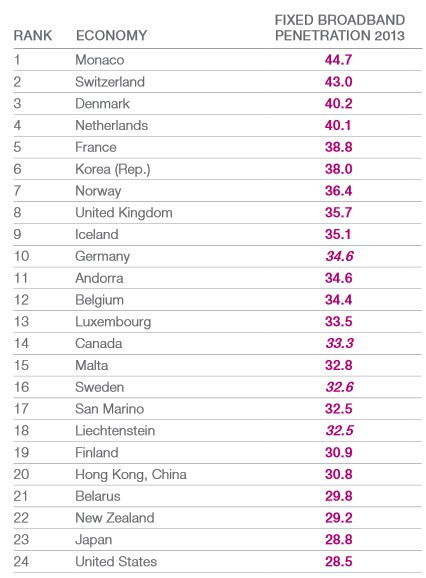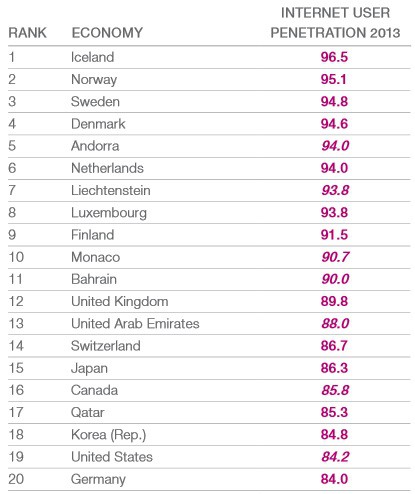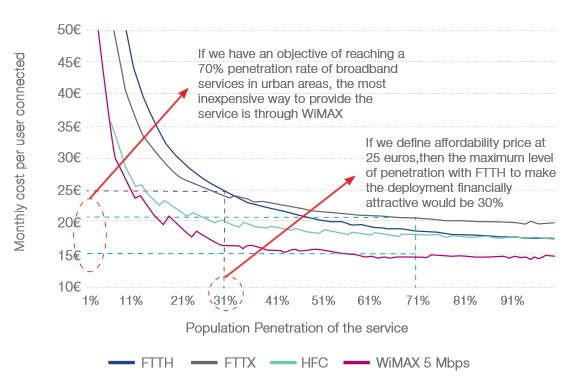All of the top-10 broadband rankings for accessibility, affordability, speed, and subscription rates have been awarded to countries in Europe and Asia, while the United States continues to fall further behind.
This week, the UN Broadband Commission issued its annual report on broadband and had little to say about developments in North America, where providers have maintained the status quo of delaying upgrades, raising prices, and limiting usage. As a result, other countries are rapidly outpacing North America, preparing the infrastructure to support the 21st century digital economy while officials in the U.S.A. and Canada cater primarily to the interests of large incumbent cable and telephone companies.
The United States has fallen from 20th to 24th place in wired broadband subscriptions, per capita. Virtually every country in western Europe now beats the United States, as does Hong Kong, Belarus, and New Zealand. Canada scored better, taking 14th place.

Only managing a meager 19th place, only 84.2% of Americans are online. Iceland has 96.5% of their population on the Internet, closely followed by the other northern European nations of Norway, Sweden and Denmark. Also scoring superior to the United States: Andorra, Bahrain, Qatar, and the United Arab Emirates. Canada did better than its southern neighbor as well, coming in at number 16.

With big profits to be made in wireless, large wireless phone companies like Verizon Wireless and AT&T helped the U.S. achieve its best rating — 10th place in wireless. But the countries that exceeded the United States did much better (Canada was not rated this year.)
With the arguable exception of wireless, the United States is no longer a world leader in broadband and continues a slow but steady decline in rankings as other countries leapfrog over the U.S.
At least 140 countries now have a National Broadband Plan in place, most maintaining stronger oversight over telecommunications infrastructure than the largely unregulated U.S. broadband marketplace. After reviewing broadband performance across most UN member states, the Broadband Commission for Digital Development recognized several traits common in countries where broadband has been particularly successful:
Competition is essential to promote enhanced broadband. A monopoly or duopoly (usually a telephone company and cable or wireless operator) is not enough to promote healthy broadband advancements. At least three, near-equal competitors are required to achieve the best upgrades and price competition. The presence of smaller competitors or those charging considerably different pricing had little effect on competition.
Countries with the best speeds have national policies promoting the installation of fiber optic technology, at least in multi-dwelling units and new developments. Although the cost of fiber and its installation can amount to as much as 80% of a broadband expansion project, many countries have been successful compelling competing providers to share a single fiber optic network (and its costs) to make the investment more affordable. In terms of ultra-high-speed broadband, there are still not many consumer apps and services that need Gigabit speeds, but such services are on their way. Experience shows that technology typically moves faster than most people anticipate – so countries and operators need to start planning now for the imminent broadband world.

A coherent regulatory foundation that emphasizes competition over regulation was the most effective policy. But regulatory frameworks must guarantee a level playing field among competitors and strong oversight to make sure competitors play fair. Regulation is not keeping pace with the changes in the market – Internet players offering equivalent voice and messaging services are, by and large, subject to relatively limited requirements (including consumer protection, privacy, interoperability, security, emergency calls, lawful intercept of customer data, universal service). Asymmetric regulation has resulted in an uneven competitive landscape for services. Governments and policy-makers need to review and update their regulatory frameworks to take into account evolving models of regulation.
Telecommunication and broadband access providers need to explore business arrangements with Internet content providers that will accelerate global investment in broadband infrastructure, to the mutual benefit of all, including end-consumers. Internet companies and Internet content providers need to contribute to investment in broadband infrastructure by debating interconnection issues and agreeing fees/revenue shares with other operators and broadband providers.
That last issue is now being hotly debated in the United States, where providers are seeking compensation from streaming video providers like Netflix, which now account for a substantial amount of Internet traffic.


 Subscribe
Subscribe